Analyzing Pessimism's Impact: A Managerial Psychology Report and Study
VerifiedAdded on 2020/06/05
|7
|1973
|378
Report
AI Summary
This report delves into the concept of pessimism within the realm of managerial psychology, examining its multifaceted impact on both individuals and organizations. It begins by defining pessimism as a mental attitude and explores its effects on work habits, employee health, and interactions among colleagues. The report highlights the contagious nature of pessimism and its potential to hinder productivity, offering real-life examples to illustrate its detrimental effects. It emphasizes the importance of maintaining a balance between pessimism and optimism and suggests strategies for managers to identify and address pessimistic behaviors within the workplace. Furthermore, the report underscores the significance of fostering a positive work environment to mitigate the negative consequences of pessimism and promote overall organizational effectiveness. The report concludes by summarizing the key findings and emphasizing the importance of managerial psychology in understanding and managing psychological patterns in the workplace.
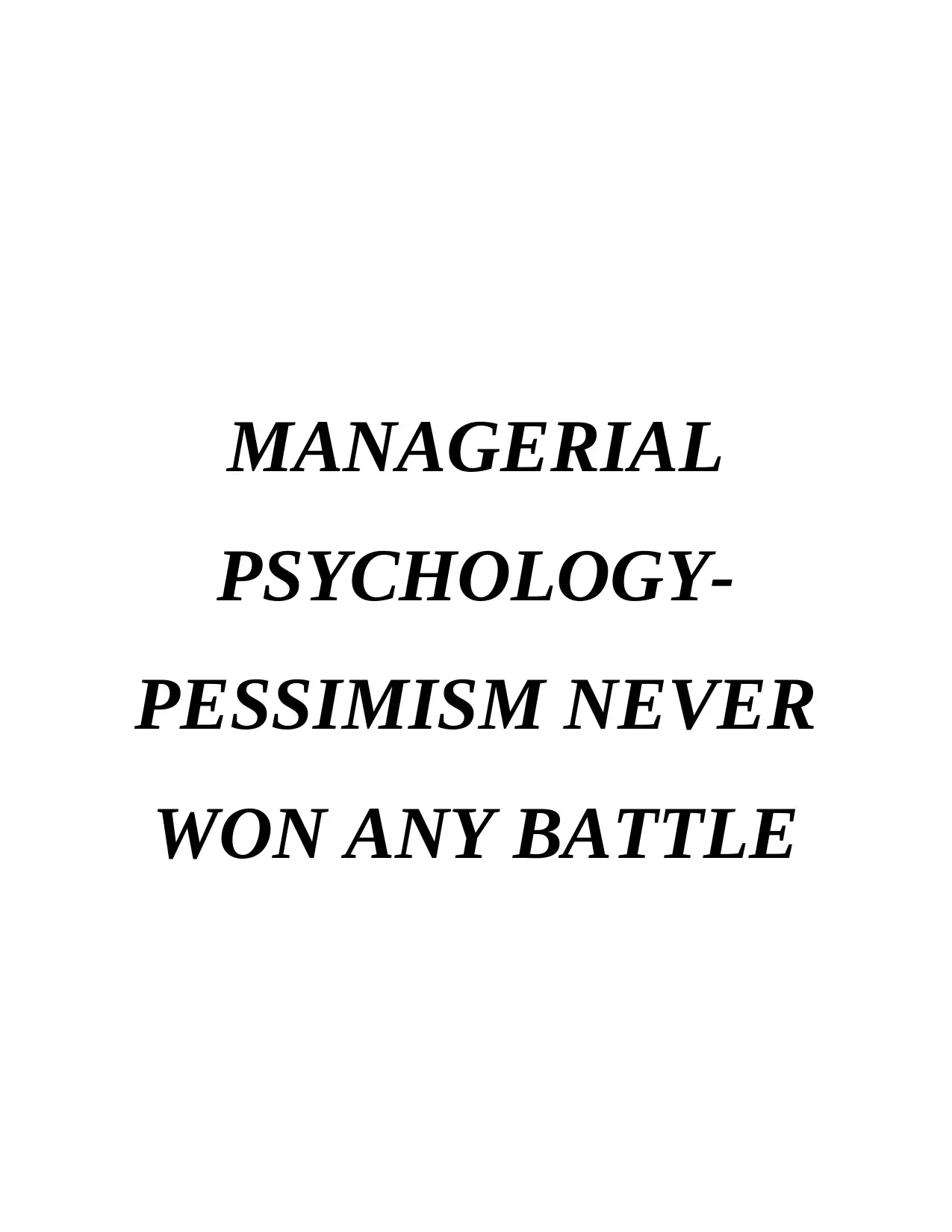
MANAGERIAL
PSYCHOLOGY-
PESSIMISM NEVER
WON ANY BATTLE
PSYCHOLOGY-
PESSIMISM NEVER
WON ANY BATTLE
Paraphrase This Document
Need a fresh take? Get an instant paraphrase of this document with our AI Paraphraser
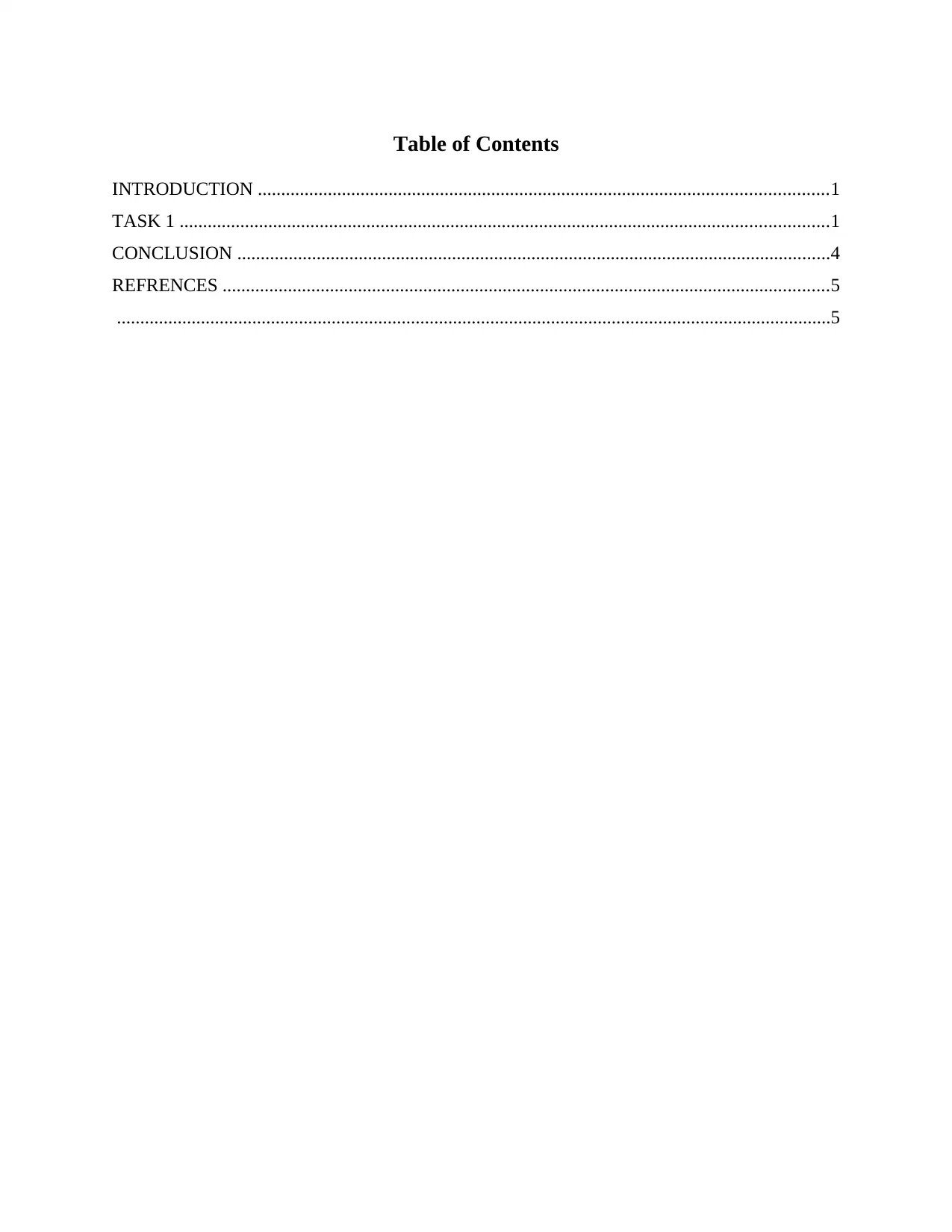
Table of Contents
INTRODUCTION ..........................................................................................................................1
TASK 1 ...........................................................................................................................................1
CONCLUSION ...............................................................................................................................4
REFRENCES ..................................................................................................................................5
.........................................................................................................................................................5
INTRODUCTION ..........................................................................................................................1
TASK 1 ...........................................................................................................................................1
CONCLUSION ...............................................................................................................................4
REFRENCES ..................................................................................................................................5
.........................................................................................................................................................5
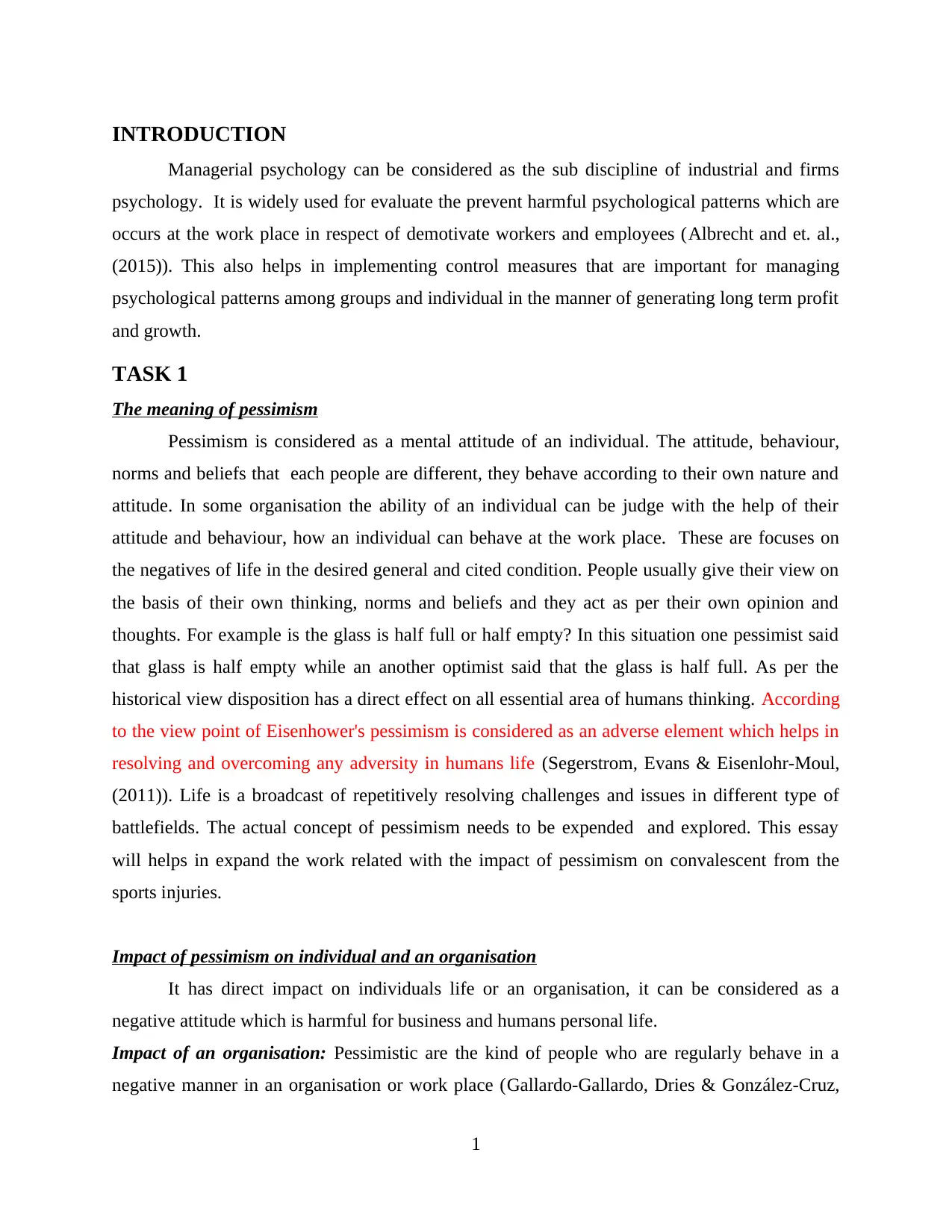
INTRODUCTION
Managerial psychology can be considered as the sub discipline of industrial and firms
psychology. It is widely used for evaluate the prevent harmful psychological patterns which are
occurs at the work place in respect of demotivate workers and employees (Albrecht and et. al.,
(2015)). This also helps in implementing control measures that are important for managing
psychological patterns among groups and individual in the manner of generating long term profit
and growth.
TASK 1
The meaning of pessimism
Pessimism is considered as a mental attitude of an individual. The attitude, behaviour,
norms and beliefs that each people are different, they behave according to their own nature and
attitude. In some organisation the ability of an individual can be judge with the help of their
attitude and behaviour, how an individual can behave at the work place. These are focuses on
the negatives of life in the desired general and cited condition. People usually give their view on
the basis of their own thinking, norms and beliefs and they act as per their own opinion and
thoughts. For example is the glass is half full or half empty? In this situation one pessimist said
that glass is half empty while an another optimist said that the glass is half full. As per the
historical view disposition has a direct effect on all essential area of humans thinking. According
to the view point of Eisenhower's pessimism is considered as an adverse element which helps in
resolving and overcoming any adversity in humans life (Segerstrom, Evans & Eisenlohr-Moul,
(2011)). Life is a broadcast of repetitively resolving challenges and issues in different type of
battlefields. The actual concept of pessimism needs to be expended and explored. This essay
will helps in expand the work related with the impact of pessimism on convalescent from the
sports injuries.
Impact of pessimism on individual and an organisation
It has direct impact on individuals life or an organisation, it can be considered as a
negative attitude which is harmful for business and humans personal life.
Impact of an organisation: Pessimistic are the kind of people who are regularly behave in a
negative manner in an organisation or work place (Gallardo-Gallardo, Dries & González-Cruz,
1
Managerial psychology can be considered as the sub discipline of industrial and firms
psychology. It is widely used for evaluate the prevent harmful psychological patterns which are
occurs at the work place in respect of demotivate workers and employees (Albrecht and et. al.,
(2015)). This also helps in implementing control measures that are important for managing
psychological patterns among groups and individual in the manner of generating long term profit
and growth.
TASK 1
The meaning of pessimism
Pessimism is considered as a mental attitude of an individual. The attitude, behaviour,
norms and beliefs that each people are different, they behave according to their own nature and
attitude. In some organisation the ability of an individual can be judge with the help of their
attitude and behaviour, how an individual can behave at the work place. These are focuses on
the negatives of life in the desired general and cited condition. People usually give their view on
the basis of their own thinking, norms and beliefs and they act as per their own opinion and
thoughts. For example is the glass is half full or half empty? In this situation one pessimist said
that glass is half empty while an another optimist said that the glass is half full. As per the
historical view disposition has a direct effect on all essential area of humans thinking. According
to the view point of Eisenhower's pessimism is considered as an adverse element which helps in
resolving and overcoming any adversity in humans life (Segerstrom, Evans & Eisenlohr-Moul,
(2011)). Life is a broadcast of repetitively resolving challenges and issues in different type of
battlefields. The actual concept of pessimism needs to be expended and explored. This essay
will helps in expand the work related with the impact of pessimism on convalescent from the
sports injuries.
Impact of pessimism on individual and an organisation
It has direct impact on individuals life or an organisation, it can be considered as a
negative attitude which is harmful for business and humans personal life.
Impact of an organisation: Pessimistic are the kind of people who are regularly behave in a
negative manner in an organisation or work place (Gallardo-Gallardo, Dries & González-Cruz,
1
⊘ This is a preview!⊘
Do you want full access?
Subscribe today to unlock all pages.

Trusted by 1+ million students worldwide
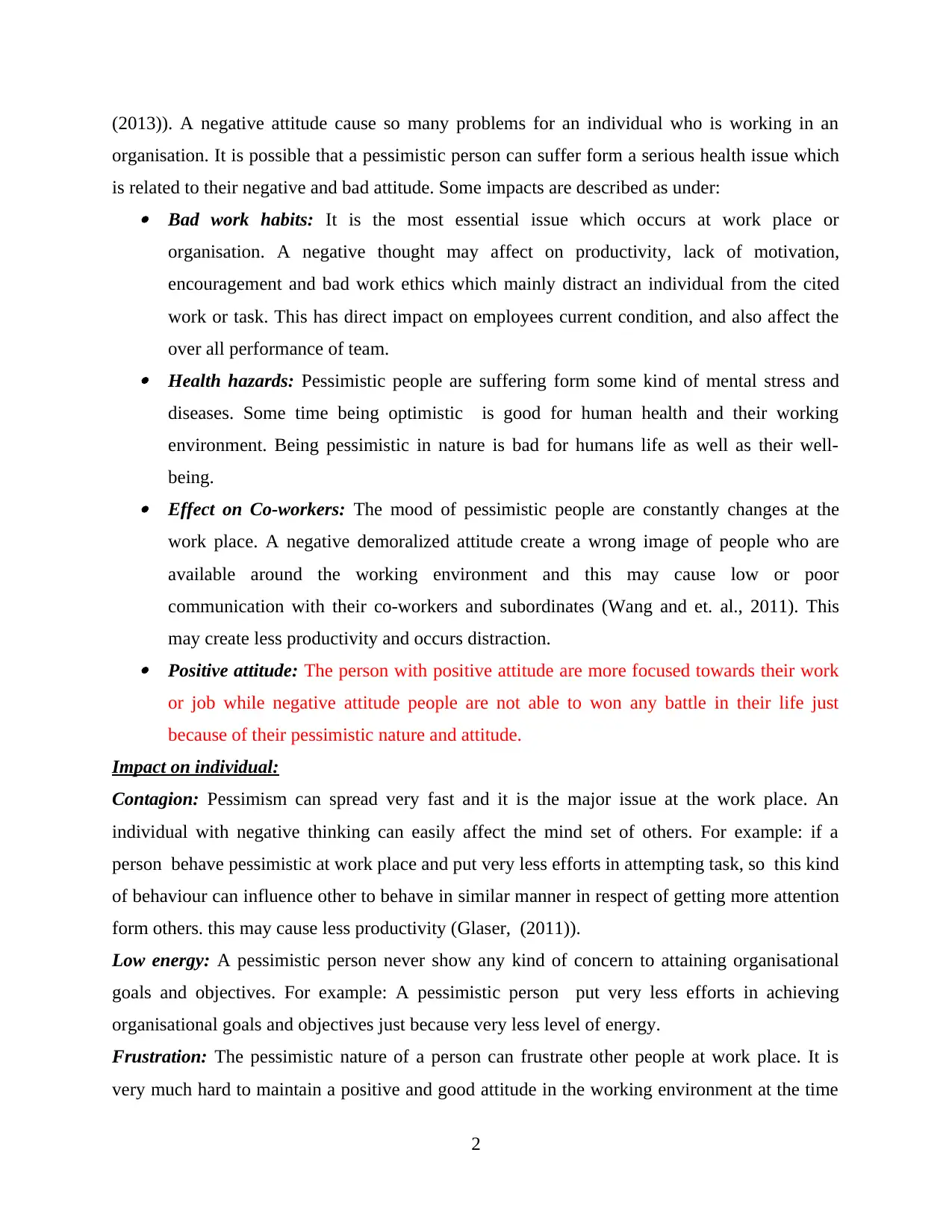
(2013)). A negative attitude cause so many problems for an individual who is working in an
organisation. It is possible that a pessimistic person can suffer form a serious health issue which
is related to their negative and bad attitude. Some impacts are described as under: Bad work habits: It is the most essential issue which occurs at work place or
organisation. A negative thought may affect on productivity, lack of motivation,
encouragement and bad work ethics which mainly distract an individual from the cited
work or task. This has direct impact on employees current condition, and also affect the
over all performance of team. Health hazards: Pessimistic people are suffering form some kind of mental stress and
diseases. Some time being optimistic is good for human health and their working
environment. Being pessimistic in nature is bad for humans life as well as their well-
being. Effect on Co-workers: The mood of pessimistic people are constantly changes at the
work place. A negative demoralized attitude create a wrong image of people who are
available around the working environment and this may cause low or poor
communication with their co-workers and subordinates (Wang and et. al., 2011). This
may create less productivity and occurs distraction. Positive attitude: The person with positive attitude are more focused towards their work
or job while negative attitude people are not able to won any battle in their life just
because of their pessimistic nature and attitude.
Impact on individual:
Contagion: Pessimism can spread very fast and it is the major issue at the work place. An
individual with negative thinking can easily affect the mind set of others. For example: if a
person behave pessimistic at work place and put very less efforts in attempting task, so this kind
of behaviour can influence other to behave in similar manner in respect of getting more attention
form others. this may cause less productivity (Glaser, (2011)).
Low energy: A pessimistic person never show any kind of concern to attaining organisational
goals and objectives. For example: A pessimistic person put very less efforts in achieving
organisational goals and objectives just because very less level of energy.
Frustration: The pessimistic nature of a person can frustrate other people at work place. It is
very much hard to maintain a positive and good attitude in the working environment at the time
2
organisation. It is possible that a pessimistic person can suffer form a serious health issue which
is related to their negative and bad attitude. Some impacts are described as under: Bad work habits: It is the most essential issue which occurs at work place or
organisation. A negative thought may affect on productivity, lack of motivation,
encouragement and bad work ethics which mainly distract an individual from the cited
work or task. This has direct impact on employees current condition, and also affect the
over all performance of team. Health hazards: Pessimistic people are suffering form some kind of mental stress and
diseases. Some time being optimistic is good for human health and their working
environment. Being pessimistic in nature is bad for humans life as well as their well-
being. Effect on Co-workers: The mood of pessimistic people are constantly changes at the
work place. A negative demoralized attitude create a wrong image of people who are
available around the working environment and this may cause low or poor
communication with their co-workers and subordinates (Wang and et. al., 2011). This
may create less productivity and occurs distraction. Positive attitude: The person with positive attitude are more focused towards their work
or job while negative attitude people are not able to won any battle in their life just
because of their pessimistic nature and attitude.
Impact on individual:
Contagion: Pessimism can spread very fast and it is the major issue at the work place. An
individual with negative thinking can easily affect the mind set of others. For example: if a
person behave pessimistic at work place and put very less efforts in attempting task, so this kind
of behaviour can influence other to behave in similar manner in respect of getting more attention
form others. this may cause less productivity (Glaser, (2011)).
Low energy: A pessimistic person never show any kind of concern to attaining organisational
goals and objectives. For example: A pessimistic person put very less efforts in achieving
organisational goals and objectives just because very less level of energy.
Frustration: The pessimistic nature of a person can frustrate other people at work place. It is
very much hard to maintain a positive and good attitude in the working environment at the time
2
Paraphrase This Document
Need a fresh take? Get an instant paraphrase of this document with our AI Paraphraser
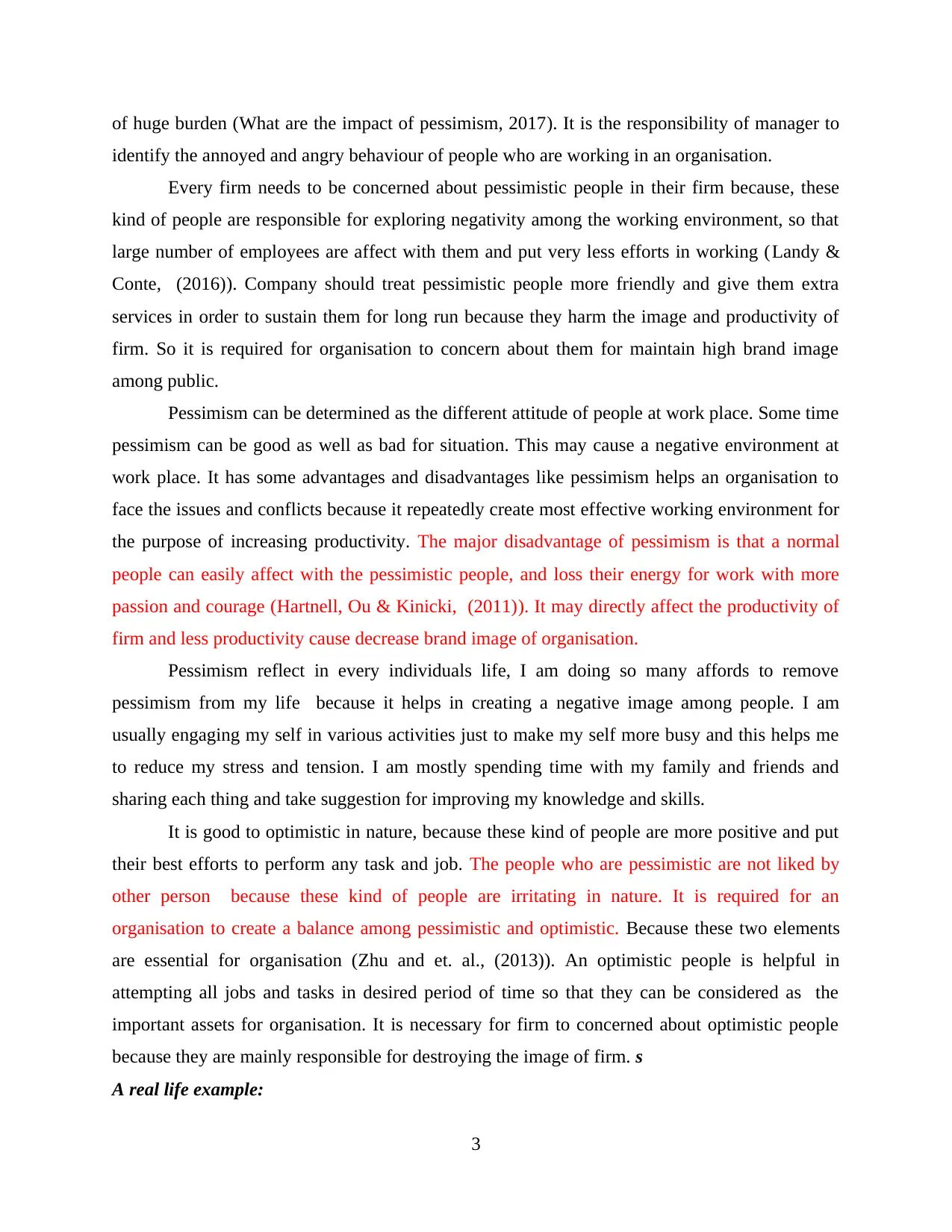
of huge burden (What are the impact of pessimism, 2017). It is the responsibility of manager to
identify the annoyed and angry behaviour of people who are working in an organisation.
Every firm needs to be concerned about pessimistic people in their firm because, these
kind of people are responsible for exploring negativity among the working environment, so that
large number of employees are affect with them and put very less efforts in working (Landy &
Conte, (2016)). Company should treat pessimistic people more friendly and give them extra
services in order to sustain them for long run because they harm the image and productivity of
firm. So it is required for organisation to concern about them for maintain high brand image
among public.
Pessimism can be determined as the different attitude of people at work place. Some time
pessimism can be good as well as bad for situation. This may cause a negative environment at
work place. It has some advantages and disadvantages like pessimism helps an organisation to
face the issues and conflicts because it repeatedly create most effective working environment for
the purpose of increasing productivity. The major disadvantage of pessimism is that a normal
people can easily affect with the pessimistic people, and loss their energy for work with more
passion and courage (Hartnell, Ou & Kinicki, (2011)). It may directly affect the productivity of
firm and less productivity cause decrease brand image of organisation.
Pessimism reflect in every individuals life, I am doing so many affords to remove
pessimism from my life because it helps in creating a negative image among people. I am
usually engaging my self in various activities just to make my self more busy and this helps me
to reduce my stress and tension. I am mostly spending time with my family and friends and
sharing each thing and take suggestion for improving my knowledge and skills.
It is good to optimistic in nature, because these kind of people are more positive and put
their best efforts to perform any task and job. The people who are pessimistic are not liked by
other person because these kind of people are irritating in nature. It is required for an
organisation to create a balance among pessimistic and optimistic. Because these two elements
are essential for organisation (Zhu and et. al., (2013)). An optimistic people is helpful in
attempting all jobs and tasks in desired period of time so that they can be considered as the
important assets for organisation. It is necessary for firm to concerned about optimistic people
because they are mainly responsible for destroying the image of firm. s
A real life example:
3
identify the annoyed and angry behaviour of people who are working in an organisation.
Every firm needs to be concerned about pessimistic people in their firm because, these
kind of people are responsible for exploring negativity among the working environment, so that
large number of employees are affect with them and put very less efforts in working (Landy &
Conte, (2016)). Company should treat pessimistic people more friendly and give them extra
services in order to sustain them for long run because they harm the image and productivity of
firm. So it is required for organisation to concern about them for maintain high brand image
among public.
Pessimism can be determined as the different attitude of people at work place. Some time
pessimism can be good as well as bad for situation. This may cause a negative environment at
work place. It has some advantages and disadvantages like pessimism helps an organisation to
face the issues and conflicts because it repeatedly create most effective working environment for
the purpose of increasing productivity. The major disadvantage of pessimism is that a normal
people can easily affect with the pessimistic people, and loss their energy for work with more
passion and courage (Hartnell, Ou & Kinicki, (2011)). It may directly affect the productivity of
firm and less productivity cause decrease brand image of organisation.
Pessimism reflect in every individuals life, I am doing so many affords to remove
pessimism from my life because it helps in creating a negative image among people. I am
usually engaging my self in various activities just to make my self more busy and this helps me
to reduce my stress and tension. I am mostly spending time with my family and friends and
sharing each thing and take suggestion for improving my knowledge and skills.
It is good to optimistic in nature, because these kind of people are more positive and put
their best efforts to perform any task and job. The people who are pessimistic are not liked by
other person because these kind of people are irritating in nature. It is required for an
organisation to create a balance among pessimistic and optimistic. Because these two elements
are essential for organisation (Zhu and et. al., (2013)). An optimistic people is helpful in
attempting all jobs and tasks in desired period of time so that they can be considered as the
important assets for organisation. It is necessary for firm to concerned about optimistic people
because they are mainly responsible for destroying the image of firm. s
A real life example:
3
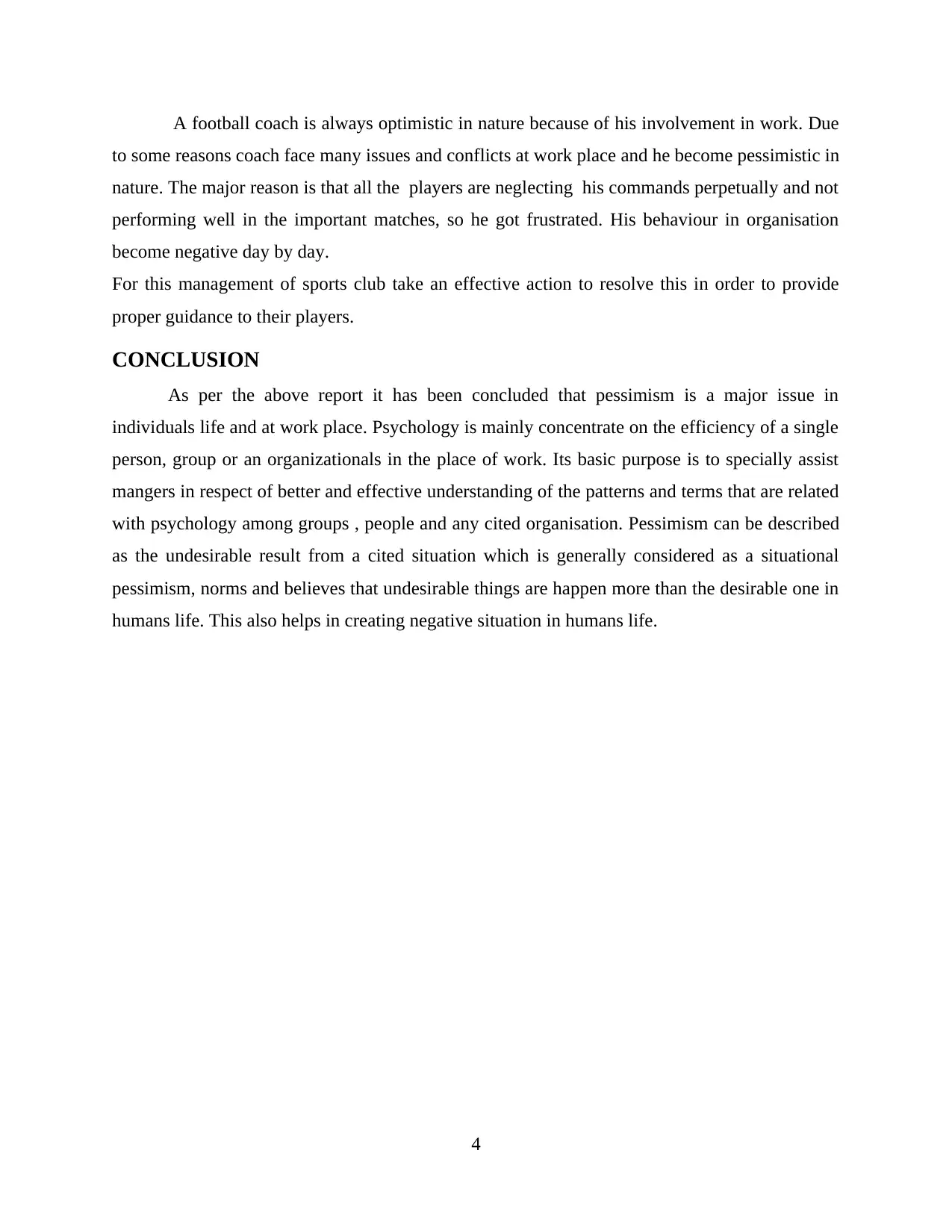
A football coach is always optimistic in nature because of his involvement in work. Due
to some reasons coach face many issues and conflicts at work place and he become pessimistic in
nature. The major reason is that all the players are neglecting his commands perpetually and not
performing well in the important matches, so he got frustrated. His behaviour in organisation
become negative day by day.
For this management of sports club take an effective action to resolve this in order to provide
proper guidance to their players.
CONCLUSION
As per the above report it has been concluded that pessimism is a major issue in
individuals life and at work place. Psychology is mainly concentrate on the efficiency of a single
person, group or an organizationals in the place of work. Its basic purpose is to specially assist
mangers in respect of better and effective understanding of the patterns and terms that are related
with psychology among groups , people and any cited organisation. Pessimism can be described
as the undesirable result from a cited situation which is generally considered as a situational
pessimism, norms and believes that undesirable things are happen more than the desirable one in
humans life. This also helps in creating negative situation in humans life.
4
to some reasons coach face many issues and conflicts at work place and he become pessimistic in
nature. The major reason is that all the players are neglecting his commands perpetually and not
performing well in the important matches, so he got frustrated. His behaviour in organisation
become negative day by day.
For this management of sports club take an effective action to resolve this in order to provide
proper guidance to their players.
CONCLUSION
As per the above report it has been concluded that pessimism is a major issue in
individuals life and at work place. Psychology is mainly concentrate on the efficiency of a single
person, group or an organizationals in the place of work. Its basic purpose is to specially assist
mangers in respect of better and effective understanding of the patterns and terms that are related
with psychology among groups , people and any cited organisation. Pessimism can be described
as the undesirable result from a cited situation which is generally considered as a situational
pessimism, norms and believes that undesirable things are happen more than the desirable one in
humans life. This also helps in creating negative situation in humans life.
4
⊘ This is a preview!⊘
Do you want full access?
Subscribe today to unlock all pages.

Trusted by 1+ million students worldwide
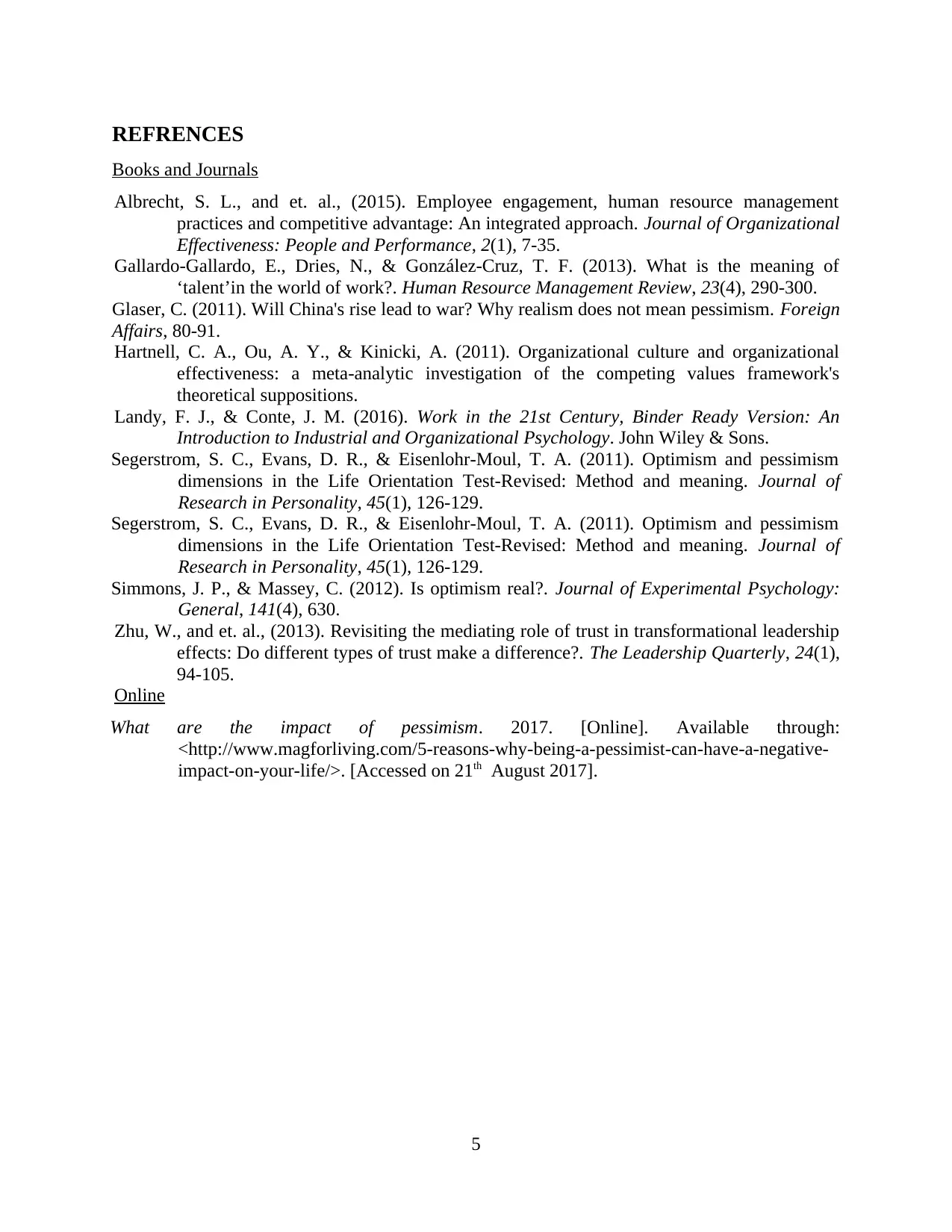
REFRENCES
Books and Journals
Albrecht, S. L., and et. al., (2015). Employee engagement, human resource management
practices and competitive advantage: An integrated approach. Journal of Organizational
Effectiveness: People and Performance, 2(1), 7-35.
Gallardo-Gallardo, E., Dries, N., & González-Cruz, T. F. (2013). What is the meaning of
‘talent’in the world of work?. Human Resource Management Review, 23(4), 290-300.
Glaser, C. (2011). Will China's rise lead to war? Why realism does not mean pessimism. Foreign
Affairs, 80-91.
Hartnell, C. A., Ou, A. Y., & Kinicki, A. (2011). Organizational culture and organizational
effectiveness: a meta-analytic investigation of the competing values framework's
theoretical suppositions.
Landy, F. J., & Conte, J. M. (2016). Work in the 21st Century, Binder Ready Version: An
Introduction to Industrial and Organizational Psychology. John Wiley & Sons.
Segerstrom, S. C., Evans, D. R., & Eisenlohr-Moul, T. A. (2011). Optimism and pessimism
dimensions in the Life Orientation Test-Revised: Method and meaning. Journal of
Research in Personality, 45(1), 126-129.
Segerstrom, S. C., Evans, D. R., & Eisenlohr-Moul, T. A. (2011). Optimism and pessimism
dimensions in the Life Orientation Test-Revised: Method and meaning. Journal of
Research in Personality, 45(1), 126-129.
Simmons, J. P., & Massey, C. (2012). Is optimism real?. Journal of Experimental Psychology:
General, 141(4), 630.
Zhu, W., and et. al., (2013). Revisiting the mediating role of trust in transformational leadership
effects: Do different types of trust make a difference?. The Leadership Quarterly, 24(1),
94-105.
Online
What are the impact of pessimism. 2017. [Online]. Available through:
<http://www.magforliving.com/5-reasons-why-being-a-pessimist-can-have-a-negative-
impact-on-your-life/>. [Accessed on 21th August 2017].
5
Books and Journals
Albrecht, S. L., and et. al., (2015). Employee engagement, human resource management
practices and competitive advantage: An integrated approach. Journal of Organizational
Effectiveness: People and Performance, 2(1), 7-35.
Gallardo-Gallardo, E., Dries, N., & González-Cruz, T. F. (2013). What is the meaning of
‘talent’in the world of work?. Human Resource Management Review, 23(4), 290-300.
Glaser, C. (2011). Will China's rise lead to war? Why realism does not mean pessimism. Foreign
Affairs, 80-91.
Hartnell, C. A., Ou, A. Y., & Kinicki, A. (2011). Organizational culture and organizational
effectiveness: a meta-analytic investigation of the competing values framework's
theoretical suppositions.
Landy, F. J., & Conte, J. M. (2016). Work in the 21st Century, Binder Ready Version: An
Introduction to Industrial and Organizational Psychology. John Wiley & Sons.
Segerstrom, S. C., Evans, D. R., & Eisenlohr-Moul, T. A. (2011). Optimism and pessimism
dimensions in the Life Orientation Test-Revised: Method and meaning. Journal of
Research in Personality, 45(1), 126-129.
Segerstrom, S. C., Evans, D. R., & Eisenlohr-Moul, T. A. (2011). Optimism and pessimism
dimensions in the Life Orientation Test-Revised: Method and meaning. Journal of
Research in Personality, 45(1), 126-129.
Simmons, J. P., & Massey, C. (2012). Is optimism real?. Journal of Experimental Psychology:
General, 141(4), 630.
Zhu, W., and et. al., (2013). Revisiting the mediating role of trust in transformational leadership
effects: Do different types of trust make a difference?. The Leadership Quarterly, 24(1),
94-105.
Online
What are the impact of pessimism. 2017. [Online]. Available through:
<http://www.magforliving.com/5-reasons-why-being-a-pessimist-can-have-a-negative-
impact-on-your-life/>. [Accessed on 21th August 2017].
5
1 out of 7
Your All-in-One AI-Powered Toolkit for Academic Success.
+13062052269
info@desklib.com
Available 24*7 on WhatsApp / Email
![[object Object]](/_next/static/media/star-bottom.7253800d.svg)
Unlock your academic potential
Copyright © 2020–2026 A2Z Services. All Rights Reserved. Developed and managed by ZUCOL.

